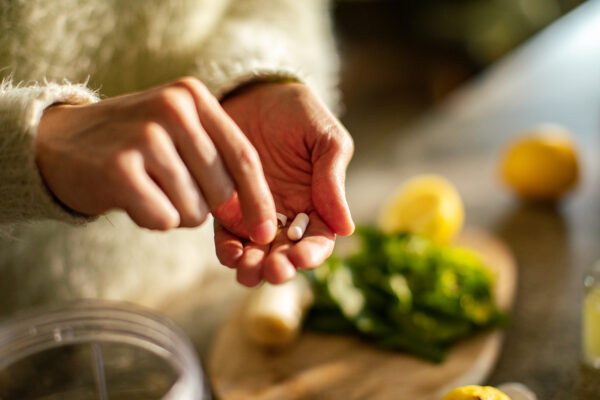The Surprising Secrets to Better Gut Health
By Jamie Bussin
Digestion is something most of us take for granted—until it stops working the way it should. From bloating to constipation to nutrient deficiencies, poor digestive health can have a big impact on how we feel day to day. I spoke with naturopath Dr. Dasha Leneva on Episode #302 of The Tonic Talk Show/Podcast to explore the “secrets” to better digestion. What followed was an eye-opening conversation that revealed just how complex and fascinating the digestive system really is. This is a digest (pun intended!) of that conversation.
“We Are What We Digest”
“You’ve probably heard the saying, ‘you are what you eat,’” Dasha says. “But it’s actually more accurate to say, ‘you are what you digest.’” The body’s ability to absorb nutrients is just as important as the nutrients themselves. Digestion isn’t just about food passing through the body; it’s about how well that food is broken down and used.
It all begins in the mouth. Chewing food slowly and thoroughly increases its surface area, making it easier for digestive enzymes in the saliva to start their work. Eating too quickly, as many of us do, skips this step and puts more pressure on the stomach and intestines to compensate.
Chewing, Satiety, and Hormones
Dasha notes another reason to slow down during meals: hormones. “When you eat slowly, your body has time to release leptin, a hormone that tells your brain you’re full.” This can help prevent overeating. Leptin interacts with dopamine—the pleasure hormone—which helps you feel satisfied, not just full. Eating too fast interrupts this hormonal exchange, which can lead to eating more than your body actually needs.
Inside the Stomach
Once food reaches the stomach, it’s mixed with gastric juices. According to Dasha, our stomachs produce up to four litres of this fluid daily, with hydrochloric acid being a major component. This acid helps break down food and activates digestive enzymes that further break down proteins.
However, not everyone produces enough stomach acid. This condition, known as hypochlorhydria, can lead to symptoms like bloating, stomach pain, and even undigested food in the stool. “Some people use supplements like betaine hydrochloride to support acid production,” she notes, adding that certain foods like spinach and whole grains naturally support this process.
The Role of the Pancreas
Digestion doesn’t stop in the stomach. The pancreas plays a vital role in the small intestine by releasing three key enzymes: amylase (for carbohydrates), protease (for proteins), and lipase (for fats). These enzymes act like “little scissors,” cutting nutrients into absorbable pieces.
The pancreas also releases bicarbonate ions to neutralize stomach acid when food moves into the small intestine. This is essential to prevent damage to the intestinal lining and to create a friendly environment for enzyme activity.
If the pancreas isn’t functioning properly—a condition known as pancreatic insufficiency—it can lead to poor digestion, nutrient malabsorption, and symptoms like gas, bloating, diarrhea, or constipation. In such cases, Dasha explained, people may take porcine-based enzyme supplements, or opt for plant-based enzymes like bromelain (from pineapple) or papain (from papaya), especially if they’re vegetarian or vegan.
Stress, Eating Habits, and Bloating
While supplements can help, Dasha encourages her patients to start by looking at their eating habits. “Ask yourself: are you chewing your food enough? Are you eating in a relaxed state?” She pointed out that many people eat on the go or while stressed, which can interfere with digestion. Simply being mindful during meals—chewing thoroughly and eating calmly—can make a noticeable difference.
Prebiotics, Probiotics, and Gut Health
Gut bacteria also play an essential role in digestion. Prebiotics are fibres that feed the good bacteria in our gut, helping them produce short-chain fatty acids, which support the gut lining and promote nutrient absorption.
Probiotics, on the other hand, are the beneficial bacteria themselves. These microorganisms help break down complex carbohydrates, proteins, and fats, making nutrients more accessible to our bodies. Foods rich in fibre, such as leafy greens, psyllium husk, chia seeds, and flax seeds, act as prebiotics by feeding these bacteria and keeping our digestive systems running smoothly.
Fibre and Bowel Health
Fibre isn’t just important for feeding gut bacteria—it’s also key for bowel regularity. Psyllium husk is an example of a powerful soluble fibre that helps with both constipation and diarrhea. In cases of constipation, it adds bulk to the stool and stimulates movement in the intestines. For diarrhea, it absorbs excess water and helps solidify the stool.
Final Thoughts
Says Dasha “Supplements can help, but chronic digestive issues may signal a more serious condition. It’s important to talk to your healthcare professional before starting anything new.”
So what’s the real “secret” to better digestion? According to Dasha, it’s not just about what we eat—it’s about how we eat, how well our digestive system functions, and the microbiome that supports us. With a bit of awareness and care, most of us can support our digestive systems naturally—and feel better as a result.




